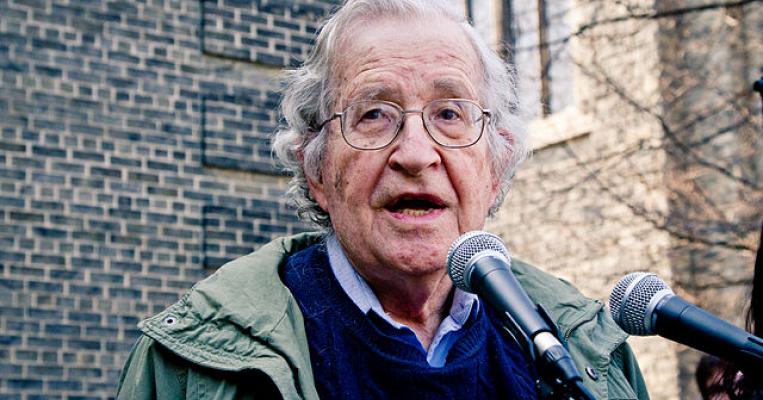
Linguists at War
THE SOURCE: “Angry Words” by Tom Bartlett, in The Chronicle Review, April 6, 2012.

THE SOURCE: “Angry Words” by Tom Bartlett, in The Chronicle Review, April 6, 2012.
Noam Chomsky is well known as a left-wing public intellectual, but in the academic world he is renowned as the father of the foundational modern theory about human language.
Chomsky’s theory of universal grammar, forged in the 1960s, has two central tenets: There is a single underlying structure for all human languages, and humans have this structural information hard-wired in their brains at birth. But many of Chomsky’s arguments are elusively theoretical. So when he published a paper in 2002 that seemed to say that the distinctive feature of human communication is “recursion,” a critic pounced.
A recursive language, explains Tom Bartlett, a senior writer at The Chronicle of Higher Education, allows for “additional phrases and clauses [to] be inserted into a sentence, complicating the meaning, in theory indefinitely.” In a new book, Language: The Cultural Tool, linguist Daniel Everett argues that a language called Pirahã (pronounced pee-da-HAN), spoken by some 250 people in a remote part of Brazil, proves Chomsky’s theory wrong because the language lacks this crucial trait. Everett’s book “is an attempt to deliver, if not a fatal blow, then at least a solid right cross to universal grammar,” Bartlett reports.
But Everett, the dean of arts and sciences at Bentley University, also offers a broader critique of Chomsky’s theory, arguing, as Bartlett puts it, “that the structure of language doesn’t spring from the mind but is instead largely formed by culture.” Everett is part of a growing band of Chomsky critics. In the new field of corpus linguistics, for example, researchers hoping to gain more empirically grounded insight into the relative roles played by biology and environment in language acquisition use computer software to analyze sentences and phrases; others use brain scans.
Even by the standards of the academic world, the fights have been brutal. Chomsky, famous for his sharp rhetoric, has called Everett a “charlatan” and hinted that he faked his data. (Everett’s argument is hampered by the fact that he is the only linguist who speaks Pirahã.) Three Chomsky allies accused Everett of racism for arguing that Pirahã falls outside the human norm, and Everett believes one of them is behind the decision by Brazilian officials to ban him from visiting the tribe, which he has studied for 30 years. Some of Chomsky’s critics dispense with the niceties, attacking universal grammar as little more than theoretical hocus-pocus. “It’s crazy to say it’s dead. It was never alive,” scoffs Ted Gibson, a cognitive scientist at MIT.
That doesn’t mean Everett has landed a bruising blow on universal grammar. He recruited Gibson to conduct his own analysis of Pirahã, expecting support for the argument that it lacks recursives. But, Bartlett reports, Gibson has found that “suggestive evidence is against [Everett’s theory] right now and not for it.”